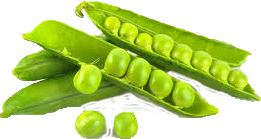|
Peas are one of
the most nutritious leguminous vegetable, rich in health benefiting
phyto-nutrients, minerals, vitamins and anti-oxidants.
Peas are
relatively low in calories when compared with beans, and cowpeas. 100 g of
green peas provide only 81 calories, contain good amount of soluble and
insoluble fibre but contains no cholesterol.
Fresh pea pods
are excellent source of folic acid. 100 g provides 65 mcg or 16% of recommended
daily levels of folates. Folates are B-complex vitamins required for DNA
synthesis inside the cell. Well established research studies suggest that
adequate folate rich foods in expectant mothers would help prevent neural tube
defects in the new-born babies.
Fresh green peas
are very good in ascorbic acid (vitamin C). Contain 40 mcg/100 g or 67% of
daily requirement of vitamin C. Vitamin C is a powerful natural water-soluble
anti-oxidant. Vegetables rich in this vitamin helps body develop resistance
against infectious agents and scavenge harmful, pro-inflammatory free radicals
from the body.
Peas contain
phytosterols especially ß-sitosterol. Studies suggest that vegetables like
legumes, fruits and cereals rich in plant sterols help lower cholesterol levels
in the body.
Garden peas are
also good in vitamin K. 100 g of fresh leaves contain about 24.8 mcg or about
21% of daily requirement of vitamin K-1 (phylloquinone). Vitamin K has found to
have potential role in bone mass building function by promoting osteo-trophic
activity in the bone. It also has established role in Alzheimer's disease
patients by limiting neuronal damage in the brain.
Fresh green peas
also contain adequate amounts of anti-oxidants flavonoids such as carotenes,
lutein and zeaxanthin as well as vitamin-A (provide 765 IU or 25.5% of RDA per
100 g). Vitamin A is essential nutrient which is required for maintaining
healthy mucus membranes and skin and is also essential for vision. Consumption
of natural fruits rich in flavonoids helps to protect from lung and oral cavity
cancers.
In addition to
folates, peas are also good in many other essential B-complex vitamins such as
pantothenic acid, niacin, thiamin, and pyridoxine. Furthermore, they are rich
source of many minerals such as calcium, iron, copper, zinc and manganese.
Weight
Management: Peas are low fat but high everything else. A cup of peas has less than 100 calories but
lots of protein, fibre and micronutrients.
Stomach cancer
prevention: Peas contain high amounts of a
health-protective polyphenol called coumestrol. A study in Mexico City
determined you only need 2 milligrams per day of this phytonutrient to prevent
stomach cancer. A cup of peas has at least 10.
Anti-aging, strong immune
system, and high energy: This comes from the high levels
of anti-oxidants including:
flavonoids: = catechin and epicatechin
carotenoid= alpha-carotene and beta-carotene
phenolic acids = ferulic and caffeic acid
polyphenols = coumestrol
Prevention of
Wrinkles, Alzheimer’s,Arthritis, Bronchitis, Osteoporosis and Candida: These come from peas strong anti-inflammatory properties. Excess
inflammation has also been linked to, heart disease, cancer, and aging in
general. These properties include: Pisumsaponins I and II and pisomosides A and
B are anti-inflammatory phytonutrients found almost exclusively in peas. vitamin C and vitamin E, and a good amount of
the antioxidant mineral zinc omega-3 fat in the form of alpha-linolenic
acid (ALA). Blood sugar regulation: High fibre slows and
protein slows down how fast sugars are digested.The
anti-oxidants and anti-inflammatory prevent or reverse insulin resistance (type
2 diabetes) All
carbohydrates are natural sugars and starches with no white sugars or chemicals
to worry about.
Heart disease
prevention: The many antioxidant and anti-inflammatory
compounds support healthy blood vessels. The formation of plaque along our
blood vessel walls starts with chronic, excessive oxidative stress and
inflammation.The generous amounts of vitamin B1 and
folate, B2, B3, and B6 reduce homocysteine levels which are
risk factor for heart disease.
Healthy for the
environment: Peas work with bacteria in the soil to ‘fix’
nitrogen from the air and deposit it in the soil. This reduces the need for
artificial fertilizers since one of their main ingredients is nitrogen. After peas have been harvested the remaining
plant easily breaks down to create more organic fertilizer for the soil. Peas are also able to grow on minimal
moisture so they are a perfect crop in many areas not needing irrigation or
using up valuable water supplies.
Prevent
constipation: The high fibre content in peas improves bowel
health and peristalsis.
Healthy bones: Just one cup of peas contain 44% of your Vitamin K which helps
to anchor calcium inside the bones. It’s B vitamins also help to prevent
osteoporosis.
Reduces bad cholesterol: The niacin in peas
helps reduce, the production of triglycerides and VLDL (very low-density
lipoprotein, which results in in less bad cholesterol, increased HDL (“good”)
cholesterol, and lowered triglycerides.
|

